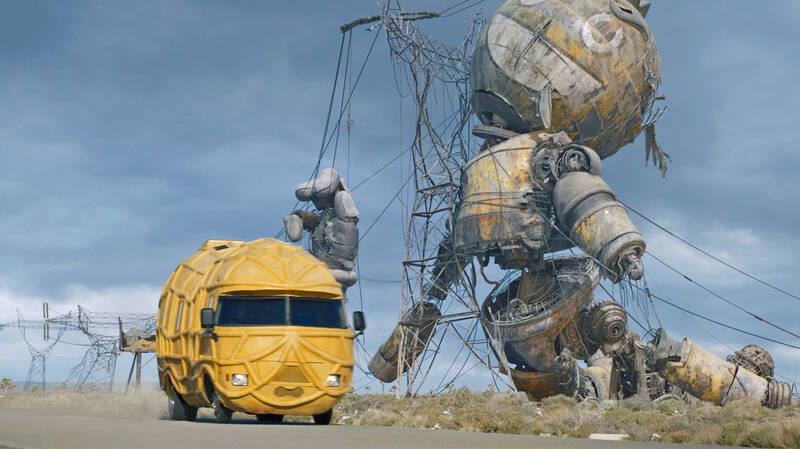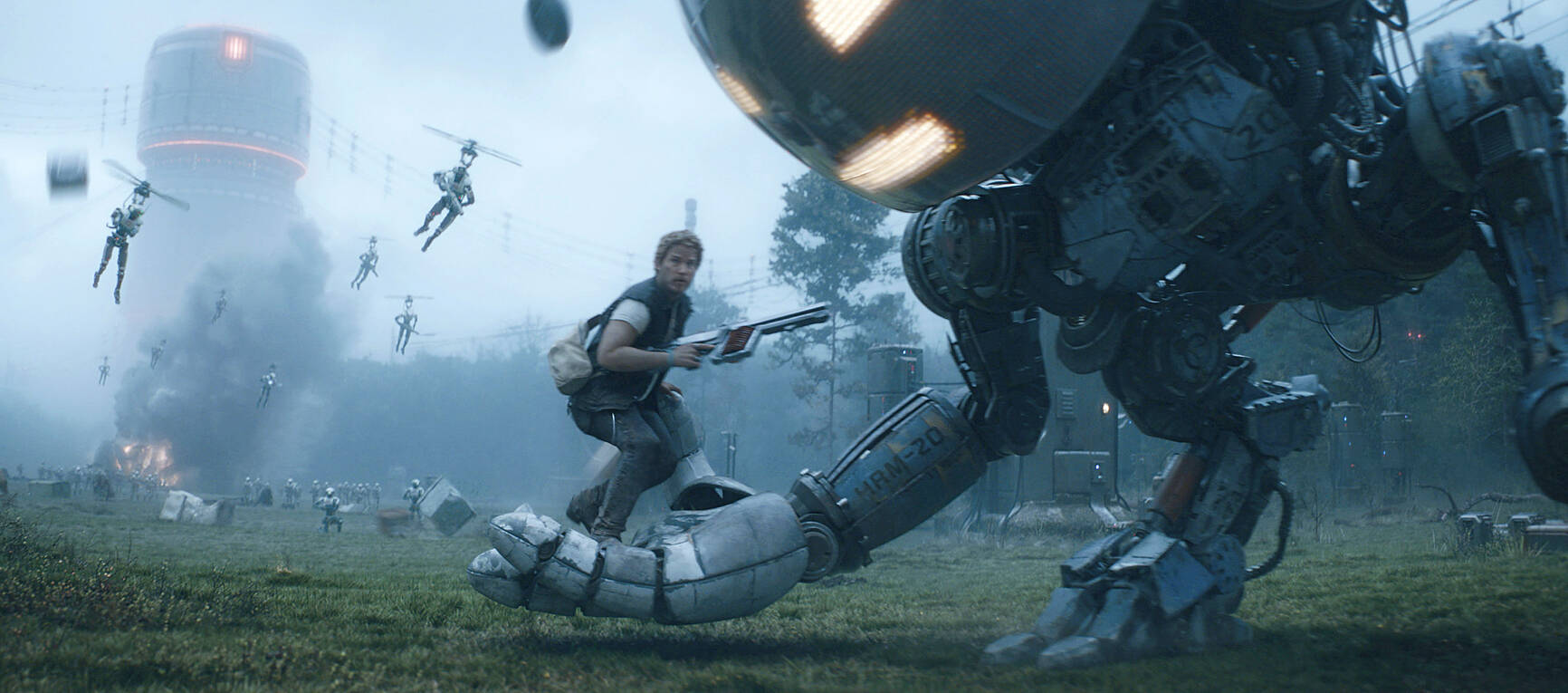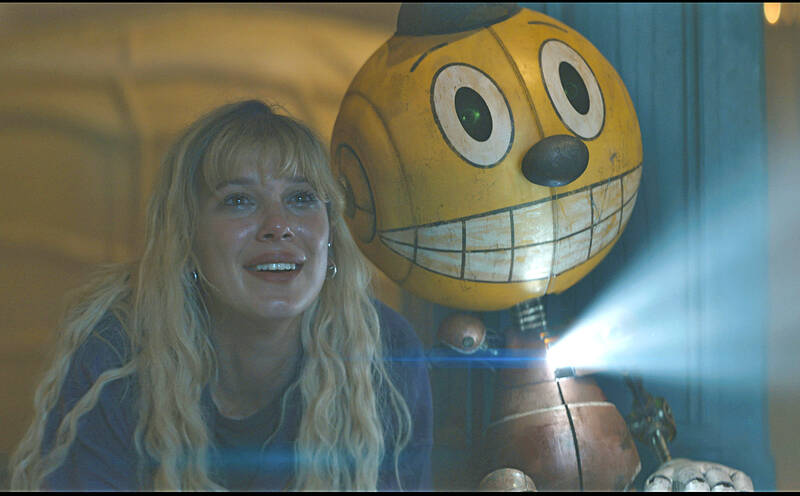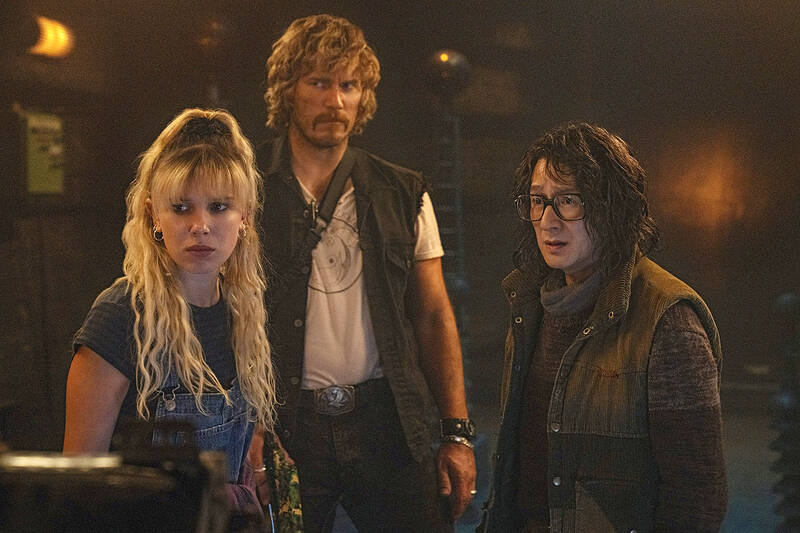If an algorithm designed a classic, big-screen spectacle for the small-screen age, The Electric State probably wouldn’t be too far off the mark.
This is an Amblin-inspired, big-budget adventure with dystopian, science-fiction wonder, nostalgic callbacks, well-liked stars (Chris Pratt! Millie Bobby Brown! Stanley Tucci! Giancarlo Esposito! Ke Huy Quan!) and the directors ( Joe and Anthony Russo ) behind some of the highest-earning movies of all time.
In theory, it should work. A kid on a dangerous, cross-country journey with a robot that may or may not be her brother whom she thought was dead? A reluctant, jaded adult companion who’s quick with a one-liner? The Electric State should be some future Spielberg’s new favorite movie, the one that they’ll reference in their Oscars speech as the thing that made them want to make movies. And yet it’s lacking a spark and a soul that might distinguish it as memorable or special. Worse, considering everything it has going for it (including a reported budget that may have exceeded US$300 million), The Electric State is kind of dull.

Photo: AP
The Electric State was loosely based on an illustrated novel by Simon Stalenhag that was released in 2018 and quickly scooped up for movie adaptation purposes with Marvel veterans Christopher Markus and Stephen McFeely writing the script. Set in the early 1990s, this is a world in which service robots have risen up and demanded rights and freedom. The humans respond by going to war.
This four-year war is skimmed over in a montage at the start of the film and, by 1994, Mr. Peanut (Woody Harrelson) is signing a peace treaty with Bill Clinton and the remaining robots are exiled to rot in the desert. The human victory was attributed to the drone creations of a Steve Jobs-ian tech billionaire Ethan Skate (Tucci), who is soon hawking his “Neurocasters” to the public. They scoop it up and soon society is just a bleak wasteland of screen zombies content to let their avatars work while they relax and fantasize a way out of their downtrodden existence.
There are shades of The Creator, WALL-E, Ready Player One and many, many more films in here. But no one gets mad that something is derivative if it’s also good. It’s only when the kitchen sink references are so clear and come up so short that it becomes a real problem.

Photo: AP
Brown plays Michelle, an angry, orphaned teenager who lost her entire family not in the war, but in a car wreck. The one she misses the most is her little brother Christopher (Woody Norman, giving the best, most emotionally authentic performance in the film), a reluctant child prodigy. One day, a robot of a cartoon character they used to watch together turns up at her foster home, speaking only in the character’s catchphrases. But after some gestures toward a photograph, she starts to believe that this robot is, somehow, Christopher, or at least someone who can lead her to the real Christopher. And thus starts their journey across America, and into the robot “exclusion zone” to figure out this puzzle. They soon team up with a war veteran/smuggler Keats (Pratt) and his snarky robot sidekick (Anthony Mackie, for your Marvel bingo card) and try to evade Esposito’s robot bounty hunter.
The robots they find in the exclusion zone are voiced by an army of celebrities you’ll go insane trying to place before angrily resorting to IMDb, including Harrelson, Hank Azaria, Brian Cox and Jenny Slate. Their designs are thoughtful and remarkable and should evoke a sense of awe in the viewer at the sheer ingenuity behind this film, where many of the most impressive shots seem to be the recreations of Stalenhag’s illustrations of dismantled, decaying robots. The action, however, gets mind-numbingly repetitive by the end of the bloated runtime.
Pratt and Brown, while fine individually, don’t really find their groove as partners on this journey either. Pratt is kind of just doing his thing and gets the few clever one-liners in the script. Brown, meanwhile, seems a little bored by yet another teen adventure role. And both ultimately look like movie stars in ‘90s cosplay, which might be a metaphor for the larger failure of the movie.

Photo: AP
The Electric State was, of course, not made by algorithm, which is an admittedly cheap shot for a Netflix original. Unfortunately, it just feels that way.

Photo: AP

Last week the story of the giant illegal crater dug in Kaohsiung’s Meinong District (美濃) emerged into the public consciousness. The site was used for sand and gravel extraction, and then filled with construction waste. Locals referred to it sardonically as the “Meinong Grand Canyon,” according to media reports, because it was 2 hectares in length and 10 meters deep. The land involved included both state-owned and local farm land. Local media said that the site had generated NT$300 million in profits, against fines of a few million and the loss of some excavators. OFFICIAL CORRUPTION? The site had been seized

Next week, candidates will officially register to run for chair of the Chinese Nationalist Party (KMT). By the end of Friday, we will know who has registered for the Oct. 18 election. The number of declared candidates has been fluctuating daily. Some candidates registering may be disqualified, so the final list may be in flux for weeks. The list of likely candidates ranges from deep blue to deeper blue to deepest blue, bordering on red (pro-Chinese Communist Party, CCP). Unless current Chairman Eric Chu (朱立倫) can be convinced to run for re-election, the party looks likely to shift towards more hardline

Sept. 15 to Sept. 21 A Bhutanese princess caught at Taoyuan Airport with 22 rhino horns — worth about NT$31 million today — might have been just another curious front-page story. But the Sept. 17, 1993 incident came at a sensitive moment. Taiwan, dubbed “Die-wan” by the British conservationist group Environmental Investigation Agency (EIA), was under international fire for being a major hub for rhino horn. Just 10 days earlier, US secretary of the interior Bruce Babbitt had recommended sanctions against Taiwan for its “failure to end its participation in rhinoceros horn trade.” Even though Taiwan had restricted imports since 1985 and enacted

The depressing numbers continue to pile up, like casualty lists after a lost battle. This week, after the government announced the 19th straight month of population decline, the Ministry of the Interior said that Taiwan is expected to lose 6.67 million workers in two waves of retirement over the next 15 years. According to the Ministry of Labor (MOL), Taiwan has a workforce of 11.6 million (as of July). The over-15 population was 20.244 million last year. EARLY RETIREMENT Early retirement is going to make these waves a tsunami. According to the Directorate General of Budget Accounting and Statistics (DGBAS), the